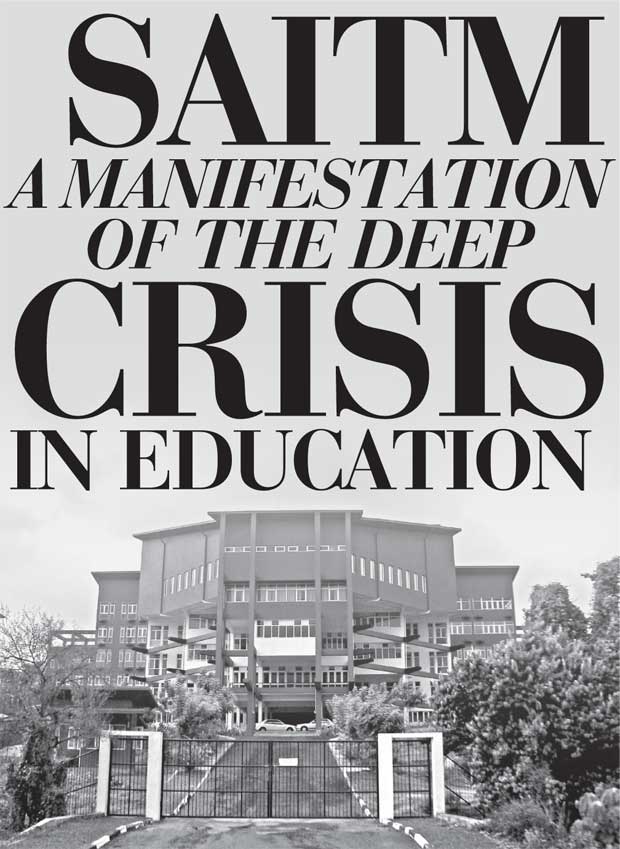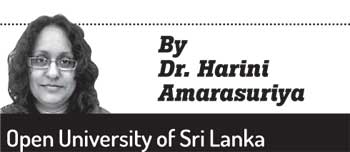Reply To:
Name - Reply Comment
Last Updated : 2024-04-19 00:03:00

Yet the focus on SAITM has also had the effect of narrowing the debate on education to a great extent. There is a bigger issue at stake here than simply the future of SAITM or even the future of medical education in our country. What is at stake is the very foundational principles on which our system of education is and should be based. 
It is easy to talk glibly of the great heritage of ‘free education’ in our country and to periodically genuflect before a portrait or statue of C.W.W. Kannangara. What is more important is to reflect seriously on the underlying principles that shaped ‘free education’ policy in this country. Even a cursory glance at the debates that took place during that period in the State Council show the depth and breadth with which the issues were discussed. Let us consider just one paragraph of the extensive report issued by the Special Committee on Education, chaired by C.W.W.Kannagara:
“The character of an educational system depends on the character of the society for which it is designed. In a totalitarian system the education system is designed to establish among all sections of the population the opinions of those who for the time being in control of the destinies of the nation. We have assumed that our task was to recommend an educational system suitable for a democracy, and that our main effort must be directed towards deriving a system that would enable every citizen to play his full part in the life of the nation. This appears to us to mean two things. First, it means that the individual must be helped to achieve the highest degree of physical, mental, and moral development of which he is capable irrespective of his wealth or social status. Secondly, it means that the individual as a result of his education should be able to use his abilities for the good of the nation in the fullest possible measure and should be able to pass judgement on affairs of the State and exercise intelligently the franchise that the State has conferred upon him. In other words, democracy requires in the first place a minimum standard of education and, beyond that, equality of educational opportunity.” (Chapter II of the Report of the Special Committee on Education 1943).
Can anyone deny the relevance of these words more than 70 years later? Unfortunately, contemporary debates on education are ignoring or taking for granted, the purpose and meaning of education, which as stated so eloquently above should be the basis on which an education system is based. What is of most relevance here, is the idea that education is not simply an individual responsibility – or one which is of value only to the individual who is educated. Rather, education here is described as having a larger, social value: not only does an educated individual have a larger responsibility towards society, it is in the interests of society to ensure that its people are educated – all its people.
This, I believe, is what should be at the crux of our debates on education today. If we can get this part of it right – the meaning and purpose of education – all else can follow. Unfortunately, discussions on education today, even when presuming to be about the quality or relevance of education are reduced to technical discussions. Should we include life skills education? Should all universities have ‘Industry’ links to promote employability? Should teacher training include gender awareness? Should people who could afford it be denied the right to choose their education options? Should tuition be banned on Sundays and Poya days? Should there be a dress code for mothers visiting schools? This is what our ‘debates’ on education are usually reduced to and, this is what education reforms are reduced to. What is not been discussed is the almost imperceptible shift away from education as having a social value to education simply being about individual development. At most, education is linked to a narrowly defined idea of contributing to economic development – thus the current preoccupation with employability, personal skills development and little else. This shift in approach also has an effect on the system of education. Not only does competition and examinations drive the education system, the responsibility for the provision of education as well as ensuring its quality is shifted to the individual.
If you are not getting the best out of education, you are not paying enough for it or you are not working hard enough. Naturally there is then an individual price and cost to education which the individual is expected to bear and it follows that the benefits should also be for the individual. If you are below 18 years, it is the responsibility of the family. Notice how invested parents, especially mothers are in education today? Many women have opted out of employment in order to focus on their children’s education. That is because increasingly families are not only paying for education, but they are actually doing most of the educating themselves. You can call it what you want: Charter Schools; School Development Committees; Parent Teacher Associations – but families are expected to bear the burden of education in multiple ways. This then naturally means that the more vulnerable and marginalised sections of society are gradually left out of education.
At tertiary education, the balance of responsibility shifts somewhat although it is now becoming increasingly common for parents to get involved in their children’s higher education as well. In fact, this has become so accepted that parents are often called upon to vouch or function as hostage for their children’s good behaviour in universities. In my own university, I have seen an increasing trend where parents not only accompany their adult children to universities to discuss subject and career choices, but also do most of the talking during these sessions. In terms of cost, the idea of raising loans for education has become far more acceptable. The assumption being that upon completing education and obtaining employment, the loans will be repaid. Once again, individual responsibility is stressed. Being politically active, engaging in extra-curricular activities, learning at your own pace, not having a definite career path are increasingly not tolerated in higher education.
What this also means is that society does not feel as if it has a stake in the education system. Some of the posts in social media show the extent to which this attitude has become normalised. For instance, SAITM students and others going to private institutions are considered to be ‘responsible’ because they pay for their own education compared to students at state universities who are wasting tax payers’ money.
The idea being that unless you pay for it yourself, you will not value education. But this also means that your responsibility is then towards yourself – and not anyone else. The social value of education and the need for society to invest in an educated population is rarely considered. Yet, as a society we complain about the increasing selfishness and self-centredness of youth; we talk about the lack of democratic and civic values among our citizens; we criticise the quality of our leaders and politicians; we bemoan the inefficiency of our bureaucrats, the lack of creativity in our artists, the lack of empathy and sensitivity among our doctors, the narrow vision of our engineers and the corruption amongst our financiers. When we make the connections among these problems and the education system, we focus our reforms on curricula revision and teacher training. So now curriculums must include ‘soft skills’, civic and human rights education and teachers must be ‘child centred’ rather than ‘teacher-centred’. Schools must become ‘child-friendly’. What we fail to see is that when the education system loses its social value, its social relevance and its sense of social responsibility, we can hardly expect the products that emerge from such a system to think beyond their individual aspirations and desires. You can’t teach civic and human rights and expect much within a system that rewards individual success even at the cost of others.
It is in this context that the issue of commercialisation and commodification of education highlighted in the SAITM debate needs to be considered. There are certain services, such as health and education at the very least, that need to be above commercial and private considerations. These services are essential for the very functioning of society. They have to be guaranteed and provided equally to all people. And that has to be the responsibility of the government not of individual private enterprise. After all, what is a government for?
This does not mean that we do not take into account the massive socio-economic changes that have taken place since 1943. The demand for education has grown (hence the interest of the private sector in investing in education – health and education are becoming two of the most lucrative areas in the economy). The unregulated and unplanned growth of ‘international schools’ is producing school leavers desiring higher education with no chance of entry into the state university system and who cannot afford or do not necessarily want to go out of the country for higher education. How do we cater to this segment of the population? The population with A/L qualifications desiring higher education has increased considerably. Yet, at the same time, certain faculties and disciplines in the state universities are struggling to survive due to lack of students. There is certainly something wrong with the university selection process as well as admission to universities.
But, the fundamental question still remains: what is the purpose and meaning of education? Unless we realise our collective responsibility for education and recognise its social value (and not simply its individual worth), our interventions in the field of education will remain superficial at best. In the absence of such a debate and leadership in education, crises such as the one before us today in the form of SAITM will only deepen. Let me repeat: “The character of an educational system depends on the character of the society for which it is designed”. The crisis in education is a reflection of the crisis in the character of our society today.
Mohan1986 Monday, 13 February 2017 01:16 PM
This is a true statement "The crisis in education is a reflection of the crisis in the character of our society today". There is no any free education in the world. Cost of State university students are paid by the tax payers, money. On the other hand, cost of SAITM students are paid by themselves. Moreover, SAITM students and their parents are also contributing for covering cost of state university students. State university students and members of GMOA do not know education is fundamental right for all people. The government has responsibility to ensure quality of the education whether it is public or private. I request from all people do not jealous for the private education

Add comment
Comments will be edited (grammar, spelling and slang) and authorized at the discretion of Daily Mirror online. The website also has the right not to publish selected comments.
Reply To:
Name - Reply Comment
On March 26, a couple arriving from Thailand was arrested with 88 live animal
According to villagers from Naula-Moragolla out of 105 families 80 can afford
Is the situation in Sri Lanka so grim that locals harbour hope that they coul
A recent post on social media revealed that three purple-faced langurs near t

10 Apr 2024
09 Apr 2024